News of the week 38
Arts faculty parties concerned about budget
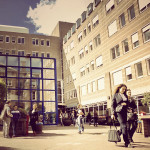 Last week, student and staff parties in the arts faculty alike agreed that prompt measures should be taken to bring the faculty out of debt. Possible measures have been suggested, but they will require preparation and no concrete plans have been made so far.
Last week, student and staff parties in the arts faculty alike agreed that prompt measures should be taken to bring the faculty out of debt. Possible measures have been suggested, but they will require preparation and no concrete plans have been made so far.
The personnel faction feels the response is taking too long, given that the budget deficit was already discussed last year. According to the faculty board, the financial problems are due in part to faculty successes: more study programmes have been added, requiring the recruitment of more staff despite insufficient revenues.
Law faculty move delayed
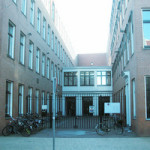 The RUG is in talks with the municipality of Groningen about delays in moving the faculty of law to the current public library building. The faculty’s move is dependent upon the public library moving into the Groninger Forum, which is likely to be completed two years later than originally planned.
The RUG is in talks with the municipality of Groningen about delays in moving the faculty of law to the current public library building. The faculty’s move is dependent upon the public library moving into the Groninger Forum, which is likely to be completed two years later than originally planned.
The municipality announced that parts of the Groninger Forum that were already built must be knocked down and rebuilt to ensure that the building is earthquake-proof. The public library can move out in 2019 at the earliest, despite an agreement that the law faculty could move in by 2017.
Study programmes selecting ‘better’ students
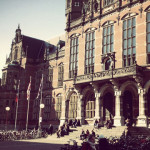 Progressively more study programmes – 70 out of 400 bachelor’s programmes in the Netherlands – are requiring students to meet additional criteria before being accepted. Around 80 per cent of the 1,200 master’s programmes have a ‘matching’ system which requires students to clearly demonstrate they are a good match for the programme before being accepted.
Progressively more study programmes – 70 out of 400 bachelor’s programmes in the Netherlands – are requiring students to meet additional criteria before being accepted. Around 80 per cent of the 1,200 master’s programmes have a ‘matching’ system which requires students to clearly demonstrate they are a good match for the programme before being accepted.
Some universities are no longer accepting students with grades lower than a seven into a master’s programme. This will also be true for certain RUG master’s. Minister Bussemaker will keep a close eye on the developments and promises to act if general accessibility is threatened.
Stricter requirements for sport sciences master’s
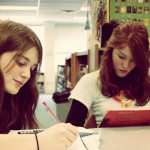 The sport sciences faculty wants to make two English master’s – human movement sciences and sport sciences – into first-class programmes for excellent students only. Next year, only fifteen students with an average score of seven or higher will be accepted into the two-year programme.
The sport sciences faculty wants to make two English master’s – human movement sciences and sport sciences – into first-class programmes for excellent students only. Next year, only fifteen students with an average score of seven or higher will be accepted into the two-year programme.
Students seeking admission must have a relevant bachelor, talent for scientific research, sufficient knowledge of English, a personal statement and two letters of recommendation. The faculties of Economics and Business (FEB) and Mathematics and Natural Sciences (FWN) also want to introduce stricter requirements for master’s degrees beginning in 2017 and 2018, respectively.
Digital ‘test desks’ defective
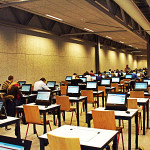 Desks with built-in computers which are used for digital testing will be replaced this fall, as they are often out of order. The RUG has to take into account that ten per cent of the computers may not work with digital testing, although no cases of missed exams due to faulty equipment have yet been reported.
Desks with built-in computers which are used for digital testing will be replaced this fall, as they are often out of order. The RUG has to take into account that ten per cent of the computers may not work with digital testing, although no cases of missed exams due to faulty equipment have yet been reported.
Due to that failure rate, more exam spaces have to be made available than are actually needed. The university will switch to more robust desks and computers from a different manufacturer. Next year, half of all exams should be digital.
Poppema new vice chairperson of VSNU
 RUG president Poppema has been appointed vice chairperson of the VSNU. He will be responsible for supervising the strategic course, amongst other things. Along with the VSNU chairperson and another newly appointed vice chairperson, they represent Dutch universities in administrative meetings with government members and other involved persons.
RUG president Poppema has been appointed vice chairperson of the VSNU. He will be responsible for supervising the strategic course, amongst other things. Along with the VSNU chairperson and another newly appointed vice chairperson, they represent Dutch universities in administrative meetings with government members and other involved persons.
The VSNU determines the strategy to enhance the quality of education and research at fourteen Dutch universities. Aside from this, the VSNU handles political issues and affairs surrounding the collective labour agreement (cao). Jan Mengelers, president of the university board of the Technical University of Eindhoven, is the other VSNU vice chairperson along with president Poppema.
‘Loan system doesn’t scare students’
 Enrolment of ‘motivated students’ is growing despite the new student loan system, according to PvdA (labour) MP Mohammed Mohandis during a debate at the Usva last week. However, Mohandis gave no definitive figures to back that claim up.
Enrolment of ‘motivated students’ is growing despite the new student loan system, according to PvdA (labour) MP Mohammed Mohandis during a debate at the Usva last week. However, Mohandis gave no definitive figures to back that claim up.
The debate was part of the first edition of the Night of the Student: an evening of music, cabaret and debates, organised by the Usva and Studium Generale. Rector Elmer Sterken debated ReThink RuG and the New University member Daan Brandenbarg. A second debate was between Mohandis and Esmée Gemke from SOG.
LSVb: ‘Where’s the money?’
 Education minister Bussemaker promised millions of euros would be invested in education as a result of ending the study grant system, but the National Student Union (LSVb) is asking: ‘Where’s the money?’
Education minister Bussemaker promised millions of euros would be invested in education as a result of ending the study grant system, but the National Student Union (LSVb) is asking: ‘Where’s the money?’
The 4,000 extra instructors that Bussemaker promised have yet to be hired. It is likely to be years before the millions are distributed, meaning that the loan system will only deliver after the first group of students paying it have graduated. But starting this year, universities will spend 200 million euros extra on education with an additional 200 million to be spent in 2018.
Elderly suffer unnecessary pain
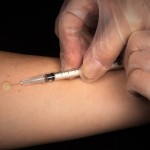 Pharmacology professor Koos Brouwers and his colleagues presented a report to the Dutch Association of Organisations for Pensioners (NVOG) and the Union KBO about the unbearable and potentially chronic pain many elderly people suffer from shingles and pneumonia.
Pharmacology professor Koos Brouwers and his colleagues presented a report to the Dutch Association of Organisations for Pensioners (NVOG) and the Union KBO about the unbearable and potentially chronic pain many elderly people suffer from shingles and pneumonia.
Shingles is a skin disease which around 30,000 elderly people suffer from. Pneumonia is also very common, and even though there are vaccines available, they are very expensive. Brouwers pleads for these treatments to become part of the Rijksvaccinatieprogramma (state vaccination programme), and thus free.
Frisian in Google translate
 The Frisian academic programme wants the language to be added to Google Translate, so they are organising the ‘Frisian Google Translate Day’ in the Harmonie building later this month. Together with Translation Bureau Popkema, students and instructors of the Frisian programme will translate as many words from English into Frisian as possible.
The Frisian academic programme wants the language to be added to Google Translate, so they are organising the ‘Frisian Google Translate Day’ in the Harmonie building later this month. Together with Translation Bureau Popkema, students and instructors of the Frisian programme will translate as many words from English into Frisian as possible.
The province of Friesland thinks the language will have a greater chance of surviving if it is available on Facebook, Google Translate or Wikipedia. Currently, there are only a couple of minority languages on Google Translate, such as Basque, Catalonian and Welsh.






